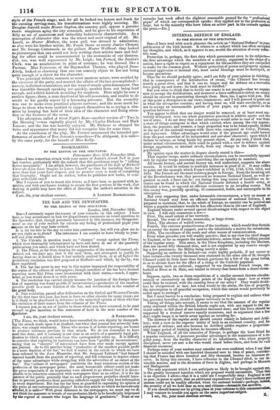THE BAR AND THE NEWSPAPERS.
TO THE EDITOR OF THE SPECTATOR.
London, 19th November 1845.
Sue—I extremely regret the tenour of your remarks on this subject I have been so long accustomed to look for dispassionate comments on vexed questions in the Spectator, that, though personally interested in this instance, my disappoint- ment as one of your readers far exceeds any feeling of professional pique your 'ensure on the bar may have evoked. It is far too late in the day to enter into controversy, but will you allow me to Set you right as to facts? 1 he inferences I am content to leave wholly to your- self and your readers. 1. The Circuits in question made no "charges" except against the Times; which were thoroughly substantiated by facts and dates in one of the quarterly publication§ you name, and which have not been denied. 2. The Times, so far from denying its suppression of the names of counsel, ad- mitted, not ten days ago, that it did omit them, and attempted to justify its having done so: it denied alone it had unfairly omitted them, or at all before the prohibitory resolution was first proposed at Stafford—and which, by the by, was there negatived.
3. The bar has never in any way in this matter impugned the respectability of the status of the editors of newspapers; though members of the bar have deemed reporting mere Nisi Prins cases inconsistent with their status,—much, I appre- hend, as you would deem it so with yours.
4. The resolution was carried simply. because the junction of the foreign func- tion of reporting was found prolific of mconvenience,—productive of the smallest possible profit to a mere fraction of the bar, and detrimental to the comfort of the great body. 5. This resolution, passed after deliberation on the Oxford and Western Circuits for the first time this year, has been in force on other circuits for many years; nor is it likely to be abandoned in deference to the uninvited opinion of those who fear the exclusion of their names from the columns of the Times.
I request you, as an act of justice to those whom you have censured, to be good enough to give insertion to this statement of facts in the next number of the Spectator.
1 am, Sir, your obedient servant, A BARRLSTER. The Times, we think, would better have consulted its own dignity by disregard- ing the attack made upon it at Stafford; but what that journal has avowedly done since, was simply retaliatory. Those who accuse it of unfair reporting, are hound to produce instances previous to that attack. We do not remember to have seen this done; and it certainly is not done in an article of a quarterly legal pub- lication to which a private note from this correspondent refers us. It is difficult to conceive that reporting by barristers can have been "prolific of inconvenience," seeing that no "charges, of misconduct have been ever made except against one journal. As to the practice being "productive of the smallest possible profit to a mere fraction of the bar," we find it stated in the article to which we have been referred in the Law kagaaine, that Mr. Sergeant Talfourd "had himself derived benefit from the practice of reporting, and felt reluctant to deprive others of the same advantages while struggling with the adversities of an outset at the bar." The "editors of newspapers" constitute the least numerous section of the profession of the newspaper press: the most honourable editors could not make the press respectable it an impression were allowed to go abroad that it is discre- ditable to be otherwise connected with newspapers than as an editor; it is for the interest of the public generally that no such preposterous prejudice should inter- fere to prevent gentlemen from assisting editors to supply the verybest information in every department. But has the bar been so guarded in expressing its opinion of the press as our correspondent alleges ? In the very article to which we have already alluded, it is said—" With great deference to the newspapers we must say we do not think the manners or morals of our profession likely to be beneficially impressed by the reproof of censors who forget the language of gentlemen." None of our remarks last week afford the slightest reasonable ground for the " professional pique" of which our correspondent speaks: they applied not to the profession at large, but to the minority who have taken an active part in the crusade against the press.—En.]


























 Previous page
Previous page